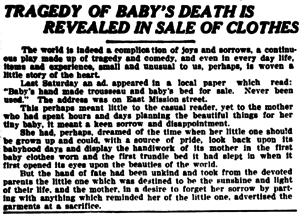For sale: baby shoes, never worn

For sale: baby shoes, never worn (in German " For sale: baby shoes, never worn ") is considered the entirety of what came to be known as the six-word story, making it an extreme example of what is called flash fiction or sudden fiction is called. Although often attributed to Ernest Hemingway , the association with him is unfounded and similar stories existed before he was even born.
Setting
The claim of Hemingway's authorship stems from an anecdote about a bet between himself and other writers. In a 1992 letter to Canadian humorist John Robert Colombo , science fiction writer Arthur C. Clarke recounts it: While having lunch with friends in a restaurant (differently known as Luchow's or The Algonquin), Hemingway bets with it the table for ten dollars each that he can make up a whole story in six words. After the bet has been placed, Hemingway writes "For sale: baby shoes, never worn" on a napkin, hands it around the table and collects his winnings.
history
The May 16, 1910 issue of Spokane Press published an article entitled "The Tragedy of the Death of a Baby Is Uncovered in the Selling of Clothes". At that point, Hemingway would have been only ten years old, years away from beginning his writing career.
In 1917, William R. Kane published an article in a magazine called "The Editor," in which he sketched the basic idea of a grieving woman who had lost her baby and even suggested the title "Little Shoes, Never Worn". In his version of the story, the shoes are given away rather than sold. He suggests that this would add some level of comfort to the seller, as it would mean that another baby would at least benefit directly from it.
In 1921 the story was already parodied: In the July issue of "Judge" a version appeared in which a stroller was used instead of shoes; there, however, the narrator described how he contacted the seller to offer his condolences, only to learn that the sale was due to the birth of twins, not the birth of a single child.
The earliest known association with Hemingway was in 1991, thirty years after the author's death. This attribution was found in a book by Peter Miller titled "Get Published !: A Literary Agent's Tips On How To Sell Your Works". He said the story was told to him in 1974 by a "well-established newspaper syndicate". In 1992, John Robert Colombo printed a letter from Arthur C. Clarke repeating history with Hemingway winning $ 10 each from fellow writers.
That connection with Hemingway was reinforced by a one-man play called Papa by John deGroot, which premiered in 1996. It is set during a photo session in Life Magazine in 1959 and has the character deGroot pronouncing the phrase. In the Playbill , deGroot defended his portrayal of Hemingway by saying, "Everything in the play is based on events as described by Ernest Hemingway or those who knew him well. Whether or not these things actually happened, we never will Really know, but Hemingway and many others claimed it was them.
legacy
The general concept of trying to tell a story with the bare minimum of words came to be known as the general term flash fiction. The six-word limit, in particular, gave birth to the concept of six-word memoirs, including a collection published in book form by Smith Magazine in 2008 and two sequels published in 2009.
Individual evidence
- ↑ a b c d e f Garson O'Toole: For Sale, Baby Shoes, Never Worn . quoteinvestigator.com. January 28, 2013. Retrieved April 19, 2013.
- ↑ a b David Haglund: Did Hemingway Really Write His Famous Six-Word Story? . Slate. January 31, 2013. Retrieved April 14, 2013.
- ^ Tragedy of Baby's Death is Revealed in Sale of Clothes . In: The Spokane Press . S. May 6, 1910. Retrieved December 9, 2013.
- ^ William R. Kane: untitled . In: The Editor: The Journal of Information for Literary Workers, Volume 45, number 4 . Pp. 175-176. February 24, 1917. Retrieved April 20, 2013.
- ↑ Peter Miller: Get Published! Get Produced !: A Literary Agent's Tips on How to Sell Your Writing . SP Books, Mar 1, 1991, p. 27.
- ^ David Mikkelson, Barbara Mikkelson: Baby Shoes . October 29, 2008. Retrieved April 14, 2013.
- ^ Six-Word Memoirs Can Say It All . CBS News. February 11, 2009. Retrieved April 20, 2013.
